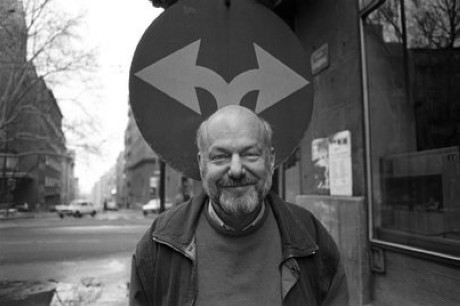


Goran Radovanovic: The Makavejev Case…

or Trial in a Movie Theatre, the subtitle.
It’s film history and it’s Yugoslav history. But it is also indirectly a reflexion on the censorship and fight for freedom of expression today, where many artists are imprisoned or exiled or…
And it’s a scoop. Brief background: Dušan Makavejev’s “WR: Mysteries of the Organism” from 1971 was celebrated at the Cannes Film Festival and was to
be screened in Yugoslavia. But the communist authorities hesitated and organised a screening in Novi Sad followed by a “public debate” – in “” as no audio or film recordings, no photos were allowed.
However sound recordist Slobodan Miletic was there, prohibited to do his job openly, had an unnoticed Nagra recorder with him, that he placed next to his seat on the first row connected to a microphone in the shirt sleeve pointing towards the loudspeaker. Voilá! Five unique sound tapes, number five was stolen, he says, but he had made a transcript of all that was said in the cinema in 1971 at the screening that was followed by a ban of the film. And Makavejev had to work abroad.
That was the challenge of Goran Radovanovic – to make an interesting film out of audio tapes from the meeting. He succeeds. He lets the Nagra be the main protagonist. It, the Nagra, goes from place to place, from one old person to the next, who listens to what their own words way back in 1971 in the cinema. Some talk cinema and about the message of the film, some bring clever philosophical statements for or against the film to be released to be seen by the Yugoslav public, many others – mostly from the party – claim the film for being totally anti-stalinist or anti-socialist, and of course many are troubled by the film’s (joyful) sex scenes. Several of these are quoted as is public archive material from the time with Tito of course, a bust of whom is placed next to the lecturn in the cinema just as it was way back – but now in a Novi Sad multiplex and not in a huge cinema hall as the sound recordist remembers it to be.
The speech by Makavejev – on the fourth tape and on the lost fifth one, read from the transcript by the actor Svetoslav Cvetkovic – is great. He talks about his fascination of Wilhelm Reich, here is a quote:
“… then in 1950, as a 20 year old student, I came across a book called “Dialectical Materialism and Psychoanalysis” … I discovered by linking Marx and Freud’s views, he merged economic-political changes of a society with changes in the individual. Reaching the position that without personal happiness there can be no joyful society. I felt it as a very Yugoslav view…”
and goes on talking about the film’s structure. There are some archive with Makavejev, the last one from 2016 where he was met in Belgrade by an audience with a standing ovation. Moving. He died this year, 2019.
Last word to the director Goran Radovanovic – taken from the press material:
… And as time passed by, this film’s ban became the symbol of Yugoslavia’s unfinished socialist experiment. Hence, my film The Makavejev Case or Trial in a Movie Theater became not just an homage to one of the greatest Eastern European filmmakers, but also an attempt to uncover the biggest trauma of socialist Yugoslavia: an attempt to establish a democracy without true freedom, or an attempt of establishing freedom without true democracy. Or, as one of the participants in the discussion held in Novi Sad in June 1971, after the screening of the film WR: Mysteries of Organism, shouted from the speaker booth of the “Arena” theatre with ideological fervor: “In our democratic community, we have the right to ban what we don’t like in our country!”…
Serbia, 2019, 74 minutes.